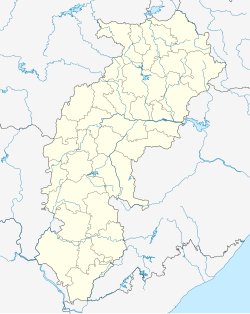Basna is a town in Mahasamund district in the Chhattisgarh state of India.
Basna | |
|---|---|
town | |
| Coordinates: 21°17′N 82°49′E / 21.28°N 82.82°E | |
| Country | |
| State | Chhattisgarh |
| District | Mahasamund |
| Elevation | 266 m (873 ft) |
| Population (2011) | |
• Total | 12,368 |
| Languages | |
| • Official | Hindi, Chhattisgarhi |
| Time zone | UTC+5:30 (IST) |
| Vehicle registration | CG 06 |
Geography
editBasna is located at 21°17′N 82°49′E / 21.28°N 82.82°E.[1] It has an average elevation of 266 metres (872 feet).
Basna is 90 km (56 mi) from District Headquarter Mahasamund and 136 km (85 mi) from Raipur the capital city of Chhattisgarh. The Odisha border is very near around (15 km (9.3 mi)) from Basna.
History
editNarsinghnath is just 47 km (29 mi) away from Basna. It is the place where Ram and Sita spent their time during their 14 years of vanvas (living in a forest). The people also claim that during the Mahabharata period, the Pandavas had also stayed here. Narsinghnath pitha is an example of religious and cultural synthesis of tribal and non-tribal people (Pasayat, 1998, 2003, 2005 2007, 2008).[2][3][4][5][6][7][8]
Demographics
editAs of 2001[update] India census,[9] Basna had a population of 12368. Males constitute 54% of the population and females 46%. Basna has an average literacy rate of 76%, higher than the national average of 59.5%; with 57% of the males and 43% of females literate. 14% of the population is under 6 years of age.
References
edit- ^ Falling Rain Genomics, Inc – Basna
- ^ Pasayat, C. (1998), Tribe, Caste and Folkculture, Jaipur/New Delhi: Rawat Publications.
- ^ Pasayat, C. (2003), Glimpses of Tribal and Folkculture, New Delhi: Anmol Pub. Pvt. Ltd.
- ^ Pasayat, C. (2005), "Oral Narrative and Hindu Method of Assimilation: A Case of Marjarakesari in Narsinghnath", The Orissa Historical Research Journal, Vol.XLVIII, No.1, pp.12-25.
- ^ Pasayat, C. (2007), Tribe, Caste and Society, New Delhi: Mohit Publications.
- ^ Pasayat, C. (2007), History of Tribal Society and Culture, New Delhi: Zenith Books International.
- ^ Pasayat, C. (2007), Tribal Non-tribal Divide: Myth and Reality, Bhubaneswar.
- ^ Pasayat, C. (2008), Oral Tradition, Society and History, New Delhi: Mohit Publications.
- ^ "Census of India 2001: Data from the 2001 Census, including cities, villages and towns (Provisional)". Census Commission of India. Archived from the original on 16 June 2004. Retrieved 1 November 2008.

